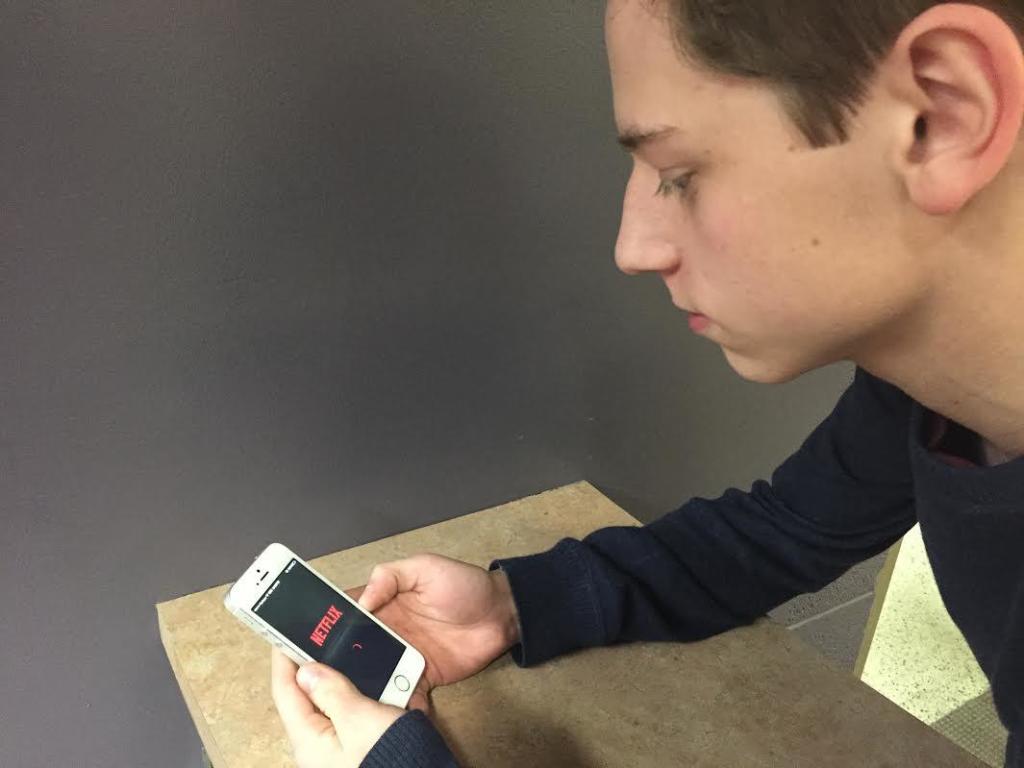The Reality of Goals
Junior Dylan Genouw watches television shows through the popular streaming network, Netflix, to unwind
“OMG relationship goals!” is a trending caption accompanying Twitter photos this calendar year. From pictures of boys asking their girlfriends to Homecoming with extravagant proposals, to a groom crying as his bride walks down the aisle, this generation of young adults is fixated on attaining the perfect relationship.
As high school careers come to an end and graduation nears, some students focus more on material goals than academic ones as a distraction from thinking seriously about their futures.
If high schoolers put as much energy into thinking about their futures as they do tweeting their every desire, maybe stress levels would go down. Substitute that perfect bedroom for a perfect office. Instead of a mailbox stuffed to the brim with love letters, picture it filled with acceptance letters.
Granted, society expects 18-year-olds to choose a lifelong profession just months after they still needed permission from their teachers to go to the bathroom. Planning for the future is overwhelming for everyone, even those who have known what they want to do with their lives since before they could walk. The stress and anxiety that accompanies a big decision are completely normal, but distracting oneself in order to avoid any real responsibilities does not make it any easier.
The most terrifying part about setting goals, however, is not the establishment, but rather the follow-through. The uncertainty of decision-making at a young age leaves most shaking in their boots, including Adams junior Alex Stevens, who knows all too well the pressures of deciding her future when it comes to applying to colleges.
“The thing that scares me the most about serious goals is that you might not succeed. If you try and fail, everyone will know about it. It’s embarrassing,” said Stevens.
In a Huffington Post study on the science of goal-setting, author Vanessa Van Edwards points to the discovery that the more one fantasizes about a goal, the less likely that person is to achieve it. Simply imagining the achievement of a goal tricks the brain into believing it has accomplished it, and in turn decreases the motivation to achieve the goal.
The average high schooler has to balance school, sports, extracurriculars, and sometimes even a job. Taking the initiative to put adult-like goals into action is a hefty weight to add to an already stress-filled agenda. Many students manage this load while still making time for fantasizing about the perfect relationship. If they just take half of their extra time and put that energy into goal setting and planning, the difference will show.
Adams counselor Mrs. Jessica Bellomo assists students in their journey to adulthood, and she understands students’ desires for an escape from thinking about their futures.
“Many students are afraid of growing up, so instead of thinking about adulthood, they set goals that will not be important 10 years from now,” Bellomo said.
For example, instead of considering a possible college major, students daydream about relationships or vacation spots.
To maintain a healthy mindset, distractions are essential in order to keep a balance between work and play. Striking the right balance continues to be a struggle for many, but once the equilibrium is found, the future may not seem as scary as it did before.
Goal setting does not necessarily mean planning the next 20 years. For a high school student, the goal should revolve around discovery – trying different things to help you decide what you want to do with the rest of your life. Passions and dreams are only realized after contemplation, trial and error, and application. After this discovery, the rest will fall into place.






